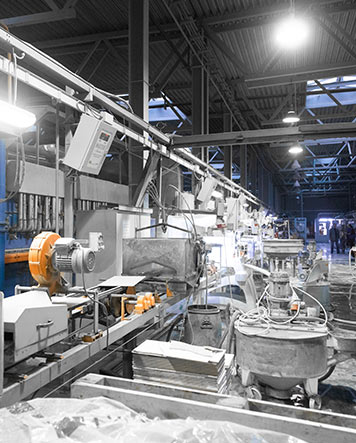Cement and glass are fundamental materials in modern construction and manufacturing. The production of these materials involves complex processes that require precise control, high temperatures, and continuous operation. Programmable Logic Controllers (PLCs) and Distributed Control Systems (DCSs) are essential automation technologies that play a vital role in optimizing efficiency, ensuring quality, and enhancing safety in cement and glass plants. This article explores the specific applications of PLCs and DCSs in these industries.
PLC Applications in Cement and Glass Manufacturing
PLCs are used extensively for discrete control tasks, managing individual machines and processes within both cement and glass plants:
Cement Manufacturing:
- Raw Material Handling: PLCs control conveyor systems, feeders, and weighing systems that transport and proportion raw materials (limestone, clay, iron ore, etc.).
- Crushing and Grinding: PLCs manage crushers, mills, and separators that reduce the size of raw materials to the required fineness.
- Kiln Feed System: PLCs control the precise feeding of raw materials into the rotary kiln.
- Clinker Cooling: PLCs regulate the cooling process of clinker (the intermediate product from the kiln) using fans and grates.
- Cement Grinding: PLCs control the grinding of clinker with gypsum and other additives to produce finished cement.
- Packaging and Dispatch: PLCs manage the packaging of cement into bags or bulk containers and the loading of trucks or trains for dispatch.
Glass Manufacturing:
- Batch House Control: PLCs control the weighing and mixing of raw materials (silica sand, soda ash, limestone, etc.) to create the glass batch.
- Furnace Charging: PLCs manage the feeding of the batch into the glass melting furnace.
- Forming Machine Control: PLCs control various forming machines, such as:
- Float Glass: PLCs control the speed and temperature of the tin bath and the drawing of the glass ribbon.
- Container Glass: PLCs control the gob formation, pressing, and blowing processes.
- Fiberglass: PLCs control the drawing of molten glass into fibers.
- Annealing Lehr Control: PLCs regulate the temperature profile within the annealing lehr, a long oven that slowly cools the glass to relieve internal stresses.
- Cutting and Inspection: PLCs control automated cutting and inspection systems that ensure the quality and dimensions of the finished glass products.
- Packaging: PLCs are used in automated packaging lines that handle the finished glass.
DCS Applications in Cement and Glass Manufacturing
DCSs are employed for continuous process control, plant-wide integration, and overall system management in both industries:
Cement Manufacturing:
- Kiln Control: The DCS is the heart of the cement plant, controlling the complex pyroprocessing within the rotary kiln. This involves regulating:
- Temperature Profile: Maintaining the precise temperature gradient within the kiln for optimal clinker formation.
- Fuel Combustion: Controlling the burners and fuel flow (coal, gas, oil, alternative fuels) to achieve efficient combustion.
- Airflow: Managing the flow of air through the kiln to support combustion and control the chemical reactions.
- Kiln Rotation Speed: Controlling the speed of the rotating kiln.
- Raw Mill Control: The DCS can oversee the entire raw milling process, coordinating multiple mills, separators, and material handling systems.
- Emissions Monitoring and Control: The DCS monitors emissions (NOx, SOx, dust) and controls pollution control equipment (electrostatic precipitators, baghouses) to ensure compliance with environmental regulations.
- Plant-Wide Energy Management: The DCS monitors and optimizes energy consumption throughout the cement plant, identifying areas for improvement and reducing energy costs.
Glass Manufacturing:
- Furnace Control: The DCS is critical for controlling the glass melting furnace, regulating:
- Temperature Control: Maintaining the precise temperature profile within the furnace for optimal melting and refining of the glass.
- Combustion Control: Controlling the burners and fuel/air ratio to achieve efficient combustion.
- Glass Level Control: Maintaining the correct level of molten glass in the furnace.
- Pressure Control: Regulating the pressure within the furnace.
- Refining and Conditioning: The DCS controls the refining and conditioning processes, which remove bubbles and ensure the homogeneity of the molten glass.
- Environmental Control: DCSs manage the environmental control systems, including scrubbers and filters, to minimize emissions.
- Plant-Wide Utilities: The DCS can manage plant-wide utilities, such as compressed air, water, and power distribution.
Hybrid Systems and Integration
As in other industries, PLCs and DCSs are often integrated in cement and glass plants:
- PLC for Local Control: PLCs handle the fast, discrete control of individual machines and processes (e.g., conveyors, feeders, forming machines).
- DCS for Overall Coordination: The DCS oversees the entire production process, manages plant-wide utilities, and provides a unified platform for monitoring and control.
- Data Exchange and Communication: PLCs and DCSs communicate with each other, exchanging data and coordinating operations.
- MES/ERP Integration: Both PLCs and DCSs can be integrated with Manufacturing Execution Systems (MES) and Enterprise Resource Planning (ERP) systems, providing real-time data for production planning, scheduling, inventory management, and quality control.
Benefits of PLCs and DCSs in Cement and Glass Manufacturing
- Increased Production Efficiency: Automation reduces cycle times, increases throughput, and minimizes downtime.
- Improved Product Quality and Consistency: Precise control ensures consistent product quality and reduces defects.
- Enhanced Safety: Automated systems reduce the risk of human error and improve workplace safety in hazardous environments.
- Optimized Energy Consumption: DCSs help to minimize energy consumption, reducing operating costs and environmental impact.
- Reduced Emissions: DCSs play a crucial role in monitoring and controlling emissions, ensuring compliance with environmental regulations.
- Data-Driven Decision Making: Real-time data from PLCs and DCSs provides valuable insights for process optimization, predictive maintenance, and continuous improvement.
Conclusion
PLCs and DCSs are essential technologies for modern cement and glass manufacturing. They provide the automation, control, and integration capabilities needed to meet the demanding requirements of these industries. By leveraging the strengths of both PLCs and DCSs, cement and glass manufacturers can optimize their operations, improve product quality, enhance safety, and reduce their environmental footprint. The trend towards hybrid systems and greater integration with MES/ERP will continue to drive further advancements in these industries.
 中文版
中文版






